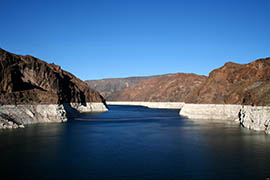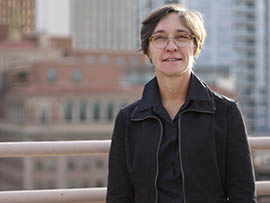Cronkite News has moved to a new home at cronkitenews.azpbs.org. Use this site to search archives from 2011 to May 2015. You can search the new site for current stories.
Named for former senator, new ASU center studies state’s most precious resource
PHOENIX – Addressing a 2013 water summit hosted by Arizona State University’s Morrison Institute for Public Policy, former U.S. Sen. Jon Kyl encouraged leaders to create a more open dialogue on the state’s most precious resource.That led to a dialogue about an ASU center that would help it happen.
“If set up right, we could facilitate a conversation for people who are concerned,” Kyl said in an interview.
Today, the Morrison Institute’s Kyl Center for Water Policy is working to create the dialogue Kyl talked about as well as figure out how to meet Arizona’s long-term water needs.
“Unless there is a consensus, it’s very difficult to get anything done,” Kyl said. “It’s pretty clear that we need to come up with a prioritized group of actions that meet the challenges that we’re going to have to deal with.”
Sarah Porter, former executive director of the Arizona Audubon Society, recently joined the center as director. listen
“I could make the argument, and win, that our long-term water supply is the most critical issue in Arizona,” Porter said. “Our future is completely bound up in it, our economy too. It’s all about water.”
Porter said one immediate goal of the center, established in November, is making sure that the Arizona Department of Water Resources has the funding it needs. She said the department is severely understaffed and underfunded.
“It is at about half the funding it was pre-recession,” Porter said. “The key agency in representing the state in water policy and helping to do the science to resolve our complicated issues is the Arizona Department of Water Resources.”
The center is also looking at adjudications, or, as Porter described, who has what rights to water. There are thousands of claims in that area, she noted.
“Until the adjudications are resolved, we really can’t have the conversation about long-term solutions for Arizona because that involves talking about the alternatives for securing water supply, how do we pay for that, and who is going to pay for it,” Porter said. “If people don’t know how much water they have, then they’re not going to be ready to be in that conversation.” listen
Michael Lacey, director of the Arizona Department of Water Resources, is an active participant in selecting the issues that the center will engage in.
“The Kyl Center is the perfect forum for addressing these issues,” he said.
Rhett B. Larson, associate professor of law in ASU’s Sandra Day O’Connor College of Law chosen as one of center’s research fellows, said that the Kyl Center is focused on collaboration and discussion as well as the overall future of water in the state.
“In order to manage resources well, you have to think 30 years ahead,” Larson said. “Water, especially in Arizona, is politically charged. It’s not like oil or coal; it has a cultural meaning. It can be contentious, especially when it’s in short supply.”
Sharon Megdal, director of the Water Resources Research Center at the University of Arizona, said there is room for more expertise on water in the state and that the Kyl Center will create even more opportunities.
“We have a lot of water policy issues to deal with in the state, and we have to sort through many options,” Megdal said. “There are many of us working on these issues, and we need to have a lot of good heads thinking of solutions.”
Kyl said he had that in mind when he gave his name to the center.
“The whole concept of the Kyl Center is to be a facilitator for everyone who wants to get together to work on these problems,” he said. “We put the word out and basically said anyone is welcome.”








